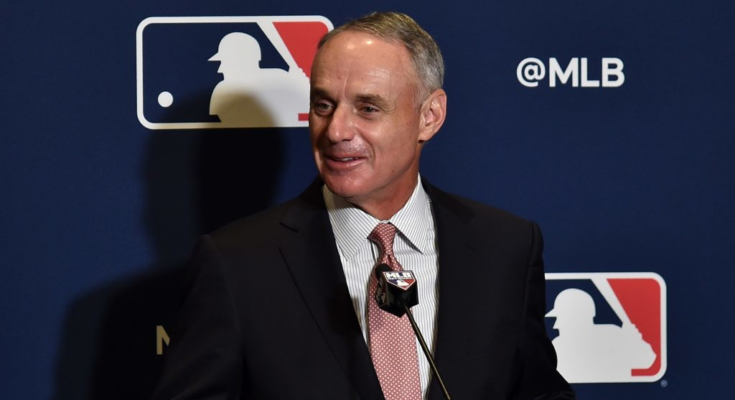The current collective bargaining agreement expires in less than two weeks, with the possibility of an offseason freeze looming. If a new deal isn’t agreed upon when the current one wraps up at 11:59 pm EST on December 1, the general expectation within the industry is that owners will lock the players out — resulting in a ban on transactions until another agreement is reached.
MLB commissioner Rob Manfred addressed the state of the labor situation when speaking with reporters (including Evan Drellich of the Athletic and Jeff Passan of ESPN) this afternoon. The commissioner stopped short of calling a lockout an inevitability, but he certainly seemed to suggest that course of action was on the table. Manfred drew a distinction between the impact a winter transactions freeze would have on the sport versus that of a work stoppage that lingers into next season.
“I can’t believe there’s a single fan in the world who doesn’t understand that an offseason lockout that moves the process forward is different than a labor dispute that costs games,” he said. As to whether the sides still had hope of hammering out a new CBA before December 1, Manfred said the league was “committed to continuing to offer proposals and suggestions in an effort to get to an agreement before” that date, but acknowledged that “time is becoming an issue.”
Technically, the expiration of the CBA wouldn’t necessitate a lockout. As MLBTR’s Tim Dierkes explored in August, the sides continued to conduct offseason business during the last winters (1993-94 and 94-95) that proceeded without a CBA in place. The players went on strike when no agreement was reached during the 1994 season, and that year’s World Series was eventually cancelled.
Manfred implied the league wouldn’t want to run the risk of negotiating without an agreement this time around, pointing to the ’94 strike and trends in other professional sports leagues as justification. “I don’t think ’94 worked out too great for anybody,” Manfred said. “I think when you look at other sports, the pattern has become to control the timing of the labor dispute and try to minimize the prospect of actual disruption of the season. That’s what it’s about: It’s avoiding doing damage to the season.”
The commissioner’s comments come amidst a background of a very slow back-and-forth between the league and Players Association. The MLBPA has made two core economics proposals over the past six months; the league has made just one, although it made an alteration to its August offer last week. It doesn’t seem there’s been much progress on economics issues, with the MLBPA pursuing such goals as raised luxury tax thresholds and earlier arbitration eligibility. The league, meanwhile, has pushed for lowered luxury tax markers and an age-based system for free agency eligibility that could delay the path to the open market for the game’s brightest stars, among other things.
While much of Manfred’s focus was unsurprisingly on the core economic structure of the game, he also touched on a few other topics. The commissioner expressed optimism about the league’s ongoing testing of pre-tacked baseballs, suggesting they hoped to test the prototype in Spring Training 2022. Manfred didn’t rule out the possibility of using a pre-tacked ball in regular season games at some point next season. He also voiced support for the possibility of a pitch clock being implemented in upcoming CBA talks, saying that “owners remain very interested in” introducing a clock at the major league level after testing it in minor league games for years.
Manfred also addressed the respective stadium situations in Tampa Bay and Oakland. He again suggested Las Vegas could be a viable landing spot for the A’s if they’re unable to work out a deal in the Bay Area. Manfred confirmed that the Rays have made a proposal to the league’s executive committee regarding the franchise’s hopes for splitting home games between Tampa and Montreal. (John Romano of The Tampa Bay Times explored the issue at greater length earlier in the week). The executive committee has yet to weigh in on the topic, Manfred said this afternoon.
Finally, the league announced the previously-reported decision to provide housing for minor league players in 2022. Josh Norris of Baseball America shed some light on the details, reporting that teams will now be responsible for leases and utility agreements for players on minor league contracts who make less than $20K per month. Norris adds further details on the base amenities (including utilities, electricity and WiFi) that acceptable residences must include. His full piece is a worthwhile read for those interested in the specifics of the new policy.


